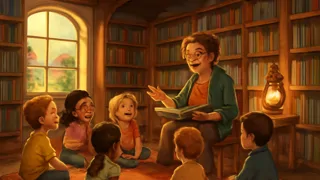Introduction
On a crisp morning just as frost began to cling to the windows of Egor Ivanovich’s wooden cottage in Zarechensk, he found himself standing at the kitchen table with a cup of strong black tea and a trembling hand. Outside, the birch trees shimmered in pale sunlight, and smoke curled lazily from chimney pots across the dirt road. Despite the peaceful village scene, Egor felt a jolt of improbable excitement: he had, on a whim, bought one last lottery ticket at the kiosk before it closed. He’d nearly forgotten all about it until a neighbor’s cat dashed through the doorway and knocked the stub onto the floor, splaying his fortune in front of him. His heart pounded as he read the numbers one by one, checking them against the slip he’d stuffed in his parka and stowed behind a loose board in his shed. With each matching digit, his breath caught until there was no doubt: he held a winning ticket for the national prize. For a modest school librarian who counted out kopeks at the grocery store and patched his boots until the leather split, this was more than a windfall—it was the opening salvo in a comedy of errors that would soon turn his quiet life upside down. Word of Egor’s victory traveled faster than frost melts at sunrise, drawing curious neighbors, distant cousins he’d never heard of, and at least one brazen fortune-teller who claimed she could multiply his prize if he agreed to her ritual under the full moon. As the sun climbed higher, each new visitor left behind a trail of schemes, demands, and unintentionally hilarious misunderstandings, turning Egor’s sturdy home into a stage for absurd dreams and half-baked plots. He realized soon enough that money might buy comfort, but it also bought trouble—often in the most entertaining form.
The Dream of Fortune
Egor Ivanovich had always been a creature of habit. Every Friday afternoon, after shelving stacks of yellowed history books in the local library, he stopped at Sasha’s kiosk for two things: a packet of sunflower seeds and a lottery ticket. Over the years, he collected more losing tickets than he cared to admit, tucking each stub into a drawer where they jostled against old receipts and faded postcards. His dreams of sudden wealth hovered at the edge of absurdity—he pictured himself fixing the leaky roof, buying his niece a proper winter coat, or finally replacing the squeaky armchair with something sturdier. Yet in his heart, Egor never truly expected to win.

But on that particular Friday, a single leftover ticket changed everything. When the official announcement came over the radio—numbers read aloud with practiced cheer by the announcer from Moscow—Egor nearly dropped his cup of tea. One by one, his digits matched in sequence until there was no mistake. Flustered, he checked and rechecked, peering at the paper in disbelief. The lottery agent had to confirm it twice before Egor would believe that the modest dreams he’d harbored for years had suddenly escalated into unimaginable reality.
News spread through Zarechensk like wildfire. At first, neighbors stopped by to congratulate him with homemade pastries and clucks of admiration. Soon after, distant relatives materialized on his porch—uncle-in-law twice removed, cousin on his mother’s friend’s side—each armed with demands and suggestions for investing the sum. A garrulous aunt insisted on a trip to Sochi; a cousin-in-really-name-only promised to launch a technology start-up. Even the local mayor dropped by, umbrellas in hand, urging Egor to fund the new community center. What started as innocent well-wishes turned into a carnival of ambition, ego, and unsolicited business plans. Egor—timid, polite, and wholly unprepared for this onslaught—found himself nodding along, hoping that a cup of tea or a plate of cookies might shorten the parade of proposals.
By dusk, Egor’s modest cottage felt more like a marketplace for other peoples’ dreams. He retreated to his bedroom, ticket safe in a small lockbox, and wondered whether fortune was a blessing or a burden. In his daydreams, wealth meant comfort; in reality, it meant managing endless expectations. As moonlight filtered through the lace curtain, Egor whispered to himself that perhaps the true price of winning was learning to say no—and finding the wisdom to keep his own hopes alive.
Chaos and Kindness
The following morning, Egor awakened to a procession of well-dressed visitors he had never met—self-proclaimed advisors with portfolios under their arms, persuasive accents, and optimistic smiles. They lined up at his front gate like soldiers waiting for orders, each certain that their plan would multiply his winnings tenfold. One man described a textile factory revival; a woman pitched an eco-village powered by wind turbines; a teenager sketched dream cottages with swimming pools. Egor, still clutching his faded dressing gown, tried to remember everyone’s names as he served tea and reluctantly listened.

Inside the kitchen, the samovar steamed, and pastries vanished faster than you could say "jackpot." Each time Egor tried to excuse himself, another idea took hold or another drink was poured. The kitchen table buckled under the weight of blueprints, business cards, and half-eaten pies. Egor realized that money—once a distant concept he barely noticed—had become a magnet for both sincere kindness and opportunistic fervor. Old friends offered to renovate his plumbing; distant correspondents asked for loans. Even Sasha, his kiosk owner, insisted on matching his gold watch to commemorate the event.
Between the chaos, however, Egor found moments of genuine warmth. Lina, the school janitor, brought him a hand-embroidered shawl and refused payment. A group of children he’d tutored volunteered to help organize his papers, turning the pile of requests into a neat stack. The local priest delivered a heartfelt blessing for his new purse, reminding Egor that material wealth could never touch what resided in the soul. These acts of kindness reminded him that the heart of any community is its people—not the currency that passes between them.
By afternoon, Egor had a notebook full of ideas, half a mind to invest in every project, and an aching headache. He closed the notebook, carefully penciled a single plan, and mailed polite decline letters to the rest. It wasn’t easy. Each refusal felt like a slight or a missed opportunity, but Egor knew he needed boundaries if he was to find peace. He walked to the village pond, gazing at water lilies drifting under coppery sunlight, and reflected on how sudden wealth can test even the kindest souls. His ticket, once a symbol of playful fantasy, now felt like a map he had to read with care.
The Day of Decision
Weeks passed, and with each day came more paperwork, interviews by local journalists, and phone calls from relatives abroad. Egor’s modest savings dwindled first in legal fees for claim processing, then in service charges for transferring large sums. Every step to secure his prize triggered another fee—a sharp reminder that money never travels unchallenged. He watched receipts pile up faster than coins, and it seemed that his dream had become a business in itself.

One chilly evening, Egor sat by the stove with a single envelope on his lap: the official check for the full lottery amount. The numbers on the document felt strangely foreign, printed in bold type and rimmed with security seals. Egor stared at it a long time, recalling the hush of that dawn when he first matched the last digit. His mind flicked through the faces of those who had come for help, those who had insisted on their share of what he’d won. He thought of Lina’s shawl, of the children’s smiling faces, of the flowers left at his door by the old librarian he admired.
With a deep breath, he made up his mind. He would keep enough to fix his home properly, to ensure his niece never shivered in the cold again, and to honor the genuine kindnesses he’d received. The rest, he decided, would go to rebuild the roof of the community library and fund after-school classes for local children—projects that would outlast any fleeting business venture. As Egor sealed his plan in a letter addressed to the lottery commission’s philanthropy branch, relief washed over him like a gentle spring rain.
When he finally stepped outside the next morning, the crisp air felt different—lighter, more open. A few neighbors lingered at the gate, expecting more schemes or announcements. Instead, Egor simply smiled, handed them each a small envelope of tickets marked "thank you," and offered an open invitation to the library’s first community workshop. There were no grand speeches, no dramatic gestures—just a quiet understanding that true wealth lies not in the number on a ticket, but in the shared moments that follow.
Conclusion
By the time winter wrapped Zarechensk in snow, Egor Ivanovich’s home and heart felt sturdier than ever. He’d repaired the leaking roof, provided warm boots for his niece, and watched children gather for books and tea in the refurbished library. The money had come with unexpected headaches—relatives’ demands, exorbitant fees, and the unending buzz of well-meaning advice—but it had also revealed the best parts of his community. He learned that wealth, when managed with care, can plant seeds that grow into something more enduring than gold. And so, in the quiet evenings by the stove, Egor often thought of that trembling lottery ticket, not as a ticket to luxury, but as a key that opened doors to kindness, wisdom, and shared joy. For him, the greatest prize was not the number on a check but the laughter of children studying under warm lights, the smell of fresh-baked bread in neighbor’s kitchens, and the knowledge that his fortune had woven a little more happiness into the fabric of his village.

















